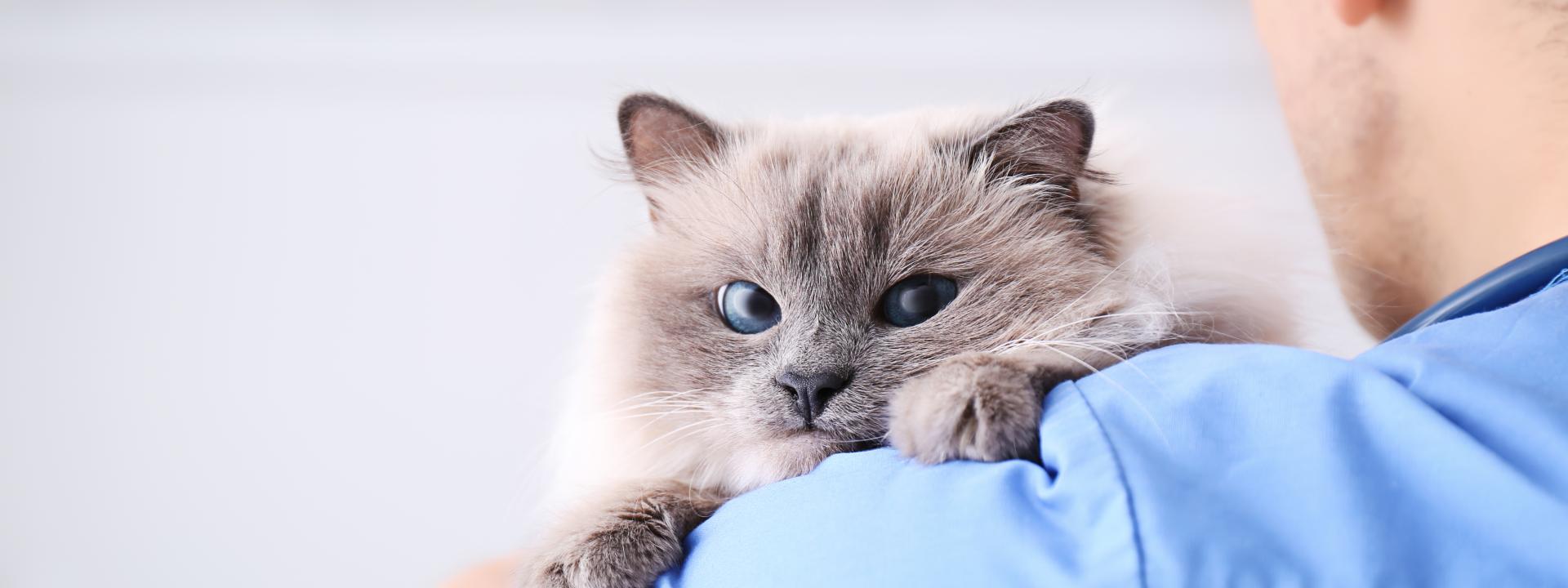Listen up—we veterinarians are human beings! We understand that just about everyone turns to Google for answers to questions they have these days, as we do the same thing. But when it comes to your precious fur babies, there are far too many instances when “Dr. Google” gives a misleading or downright wrong answer. This can lead to a prolonged illness that could have been nipped in the bud, possibly painful scenarios for your pet, or even death. We know, we know, this is depressing news, but if you’re well informed about the scenarios that require veterinary care for your pet and, for the sake of this particular article, your cat, you will be fine!
We’ve taken some time to answer some FAQs on this very topic so that you'll know when you might be able to wait out a situation with your cat while you monitor it or whether you need to put the cat in the carrier and get to the vet STAT.
How do I know whether to take my cat to the vet?
If your cat isn’t feeling well enough to eat, or if they’re repeatedly vomiting, having issues urinating or defecating, or they’re lethargic and not moving around much, take them to the vet.
Do I need to take my cat to the vet for a cold?
Cats get a lot of upper respiratory congestion, and they tend to be viral in nature. If the cat is mildly ill with just a bit of sneezing, the fluid coming out of their nose is clear, and they’re eating and drinking, you’re probably okay. However, if they have a fever above 102, and they’re not eating or drinking, or if the fluid they’re sneezing out is yellow or green or bloody, seek veterinary intervention.
If it’s a viral infection, there isn’t much we can do for cats. But if they get a secondary bacterial infection, then your veterinarian can intervene with antibiotics. Also, if the cat’s not eating or drinking well, we can try other supportive methods, like subcutaneous fluids or appetite stimulant medications. There’s a lot we can do to ease their discomfort while they’re recovering.
What are some signs that my cat needs veterinary attention?
The most urgent need for veterinary care that we most frequently see is a cat that’s having trouble urinating. Many people don’t realize that even neutered tomcats can develop a urinary obstruction. That’s the biggest veterinary emergency we see besides significant trauma. If the cat is going to the litter box and is making efforts to go but can’t, that is a true emergency.
Other things that can wait a bit longer are perhaps if the cat is limping or if they’re not eating or drinking much, but they are at least eating or drinking a bit. But if the cat is having diarrhea, vomiting repeatedly, running a fever, is really lethargic, or has trauma or toxicity, that’s a cat that needs prompt veterinary care.
How do I know if my cat isn’t just simply getting older or if there is something wrong?
This is one that gets under our skin as veterinarians a bit, as age isn’t a disease! We can’t look at a cat and say, "Oh well, he’s 15, and that’s to be expected." Most cats that are getting older and are starting to have symptoms out of the ordinary have something wrong.
The most common things we see in older cats are kidney failure, diabetes, tumors, and hyperthyroidism. Those are all conditions that require veterinary care, and they can be treated quite well—some better than others. But again, you can’t just chalk this up to them being old and slowing down. Any symptom of weight loss, lethargy, or changes in eating or drinking patterns all merit a trip to the veterinarian to get some diagnostics done. We can treat and manage many of those illnesses really well if we get to see the cat before the diseases have progressed too far.
Do veterinarians take care of stray cats?
This is an interesting question for veterinarians, as we often get clients who come in and say, “This isn’t really my cat. It’s a stray cat.” And then we ask them if they’ve been feeding them, and they reply in the affirmative. When we ask how long they’ve been feeding them, they’ll say, “Three years.” That’s not a stray cat—that’s your cat! Many people will try to deflect the ownership onto someone else to get the vet bill taken care of, but if you’re not at a humane society or a shelter, there is, of course, going to be a charge associated with treating that cat. A stray cat is only a stray cat until you pick them up, put them in the car, and drive them to the vet!
My cat hasn’t eaten in a day or so? Should I bring them to the vet?
Yes, a cat that hasn’t been eating or drinking is a sick cat. As previously mentioned, there can be many reasons for that—an upper respiratory infection, an intestinal blockage, or urinary obstruction or blockage. If the cat’s in heat and you’re sure she’s in heat, it’s probably okay to wait as cats in heat often don’t eat well for a day or two. But that would be one of the only reasons to wait, and you have to be certain that the cat is, indeed, in heat. If you’ve done a diet change or something else that explains the loss of appetite, then you might be okay. Switch back to the old diet and see if that does the trick. Most times, however, if a cat isn’t eating or drinking, that warrants a trip to your veterinarian.
Do I need to take my cat to the veterinarian for dental care?
Cats are the most overlooked species when it comes to dental care, and, yes, they need it! Cats get dental disease that dogs don’t get. Dogs get tartar and break their teeth. Cats can have both of those things happen, but they can also get dental lesions similar to cavities (aka caries). Those cats are really painful. We can also see feline stomatitis. Which is inflammation of the gums, and those cats are also really painful. We need to intervene with dental care that may require anesthesia to get a good look at the cat’s mouth due to their pain.
Unfortunately, many cat owners assume that any cat that’s still eating doesn’t have dental issues. The truth is, any cat that enters their teens and older needs veterinary dental care. Of course, if you notice any dental issues when the cat is younger than that, please seek veterinary care to help your cat avoid unnecessary pain.
We understand that going to the vet isn’t always the most cost-effective or convenient event in your life, especially with cats, who are notoriously hard to get there! However, we also know that cats are very stoic creatures and tend to hide pain well. As such, if you see signs or symptoms that something is wrong, such as a sudden change in your cat's behavior, you need to be the best pet parent you can be and bring that cat to us. If you have any further questions about cat illnesses or disease, please feel free to give us a call!

